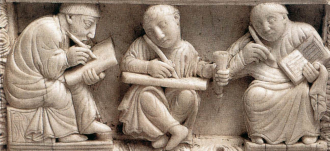New Testament scribes, the organization of which began at the time of Ezra the prophet, were men trained to write. At first they were merely transcribers of God's law and synagogue readers. They later became interpreters of God's law whose responsibility was to teach the Torah.
Scribes produced legal documents, recorded deeds, etc. and could act as notary public and court secretary. Although some of them copied documents, this was not necessarily a part of their job.
As in other parts of the world, these people were considered honored professionals whose modern day equivalent would be judges or lawyers. They were generally the most educated men in the nation and as such became influential.
In fact, since writing was practiced only by those with a certain level of intelligence, scribes were often considered wise men (1Chronicles 27:32). They were also eligible to be elected to the Sanhedrin (the supreme and highest council of the Jews).

Their high regard as teachers of the law was such that the apostle Paul warned Timothy to be wary of those who pretended to be one of them (1Timothy 1:5 - 7). Jesus referenced their authority to convey God's word to the people when he said, "The scribes and the Pharisees sit in Moses' seat . . ." (Matthew 23:2).
This group, along with other religious leaders, are usually portrayed in the Gospel accounts as opponents of Jesus who actively sought to put him to death (Mark 11:27). Jesus knew in advance, and stated such to the disciples, that their role would be big in regard to helping bring his ultimate death on the cross (Mark 8:31, Matthew 16:21).
The book of Acts portrays the scribes as opponents of early Christianity (Acts 4:5; 6:12). Some few, however, were neutral (Matthew 13:52), or were even praised by Jesus (Mark 12:28 - 34), or rose to defend the apostle Paul (Acts 23:9).
A Job of Precision
Scribes followed meticulous procedures and methods for making copies of God's law (Torah). For example, those who performed the copying were permitted to use ONLY animal skins that were clean for writing. Additionally, the ink they used had to be prepared using a very special formula and had to be black in color.
Before each time a scribe wrote the name of God they were to completely wash both their writing instruments and themselves. Each word had to be read aloud before it was written down.
Additionally, every column written by one of the scribes had to have a minimum of 48 lines of text. They were not allowed to write columns that had 61 lines of text or more. Their work was generally reviewed within thirty days. If 3 or more pages required any corrections, the entire manuscript had to be rewritten.
Scribes had to count the number of letters, words, and so on of each manuscript they wrote. If just two letters touched each other the document was deemed invalid. Once completed and verified, the manuscripts were usually put in a sacred place.